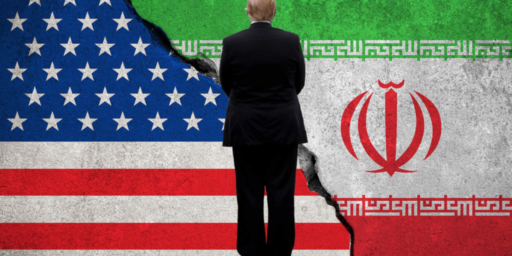Bush Surging to Comeback?
Der Spiegel’s Gabor Steingart has written “The Comeback of a War President,” the first positive piece on President Bush I’ve seen (outside the usual suspects) since roughly since maybe the spring of 2005.
He may be America’s most unpopular politician, but George W. Bush is no lame duck. As a wartime president, Bush dominates the political agenda. He is discreetly influencing his party’s choice of presidential candidate while committing his country to an aggressive foreign policy, the effects of which are likely to continue well beyond his term in office.
The first sentence is obviously true, even if it goes against the conventional wisdom. That says little about Bush; it’s just the nature of his office. The second sentence, though, is a harder sell. Certainly, it conflicts with the wisdom of the recent “Most Influential American Conservatives” assessment.
Steingart makes two points in his defense:
First, there has been noticeable improvement on the Iraqi war front. Unless the Pentagon statistics Bush recited on Friday in a speech to soldiers at Fort Jackson, South Carolina, are made up, the new Iraq strategy appears to be working. The number of weekly bombing attacks on US troops has dropped by half, and the number of US military deaths is the lowest in a year and a half. At the same time, US forces are arresting or killing more than 1,500 terrorist “thugs,” as Bush called them, each month. If the military successes continue, public opinion toward Bush and his Republicans could soon improve. Americans are not against war itself, they just don’t like losing.
That much is more-or-less right. Whether because of the Surge or a combination of domestic factors, Al Qaeda in Iraq is on the ropes, casualties are down, and various other indicators on the security front are positive. And Americans desperately want to feel good about any war this costly, so they’ll naturally rally if the good news is sustained. None of that means that the war will be “won” under its original terms, though.
Second, Bush dominates his party’s search for a suitable presidential candidate, and he does so without voicing a preference for any of the candidates. Instead, he exerts control by dictating the job description. According to Bush, the right man for the job would not be an economic expert or a seasoned diplomat, but a sheriff, a man with nerves of steel, a man who can lead. Of course, for Bush being a strong leader means, first and foremost, leading the nation into war.
I’m much less sure of this piece. Yes, Bush is setting the stage for the foreign policy debate. It’s far from clear, though, that he’s getting his way.
Steingart continues:
The Bush agenda — wage war! — is the country’s agenda. His goal — victory! — sets the tone for the 2008 presidential race. And the mood he has created — fear of further terrorist attacks — has taken hold among the majority of voters. For the American public, even a narrow-minded view of reality is still a reality.
In this mood, Bush is driving the Democrats along like a sheepdog herding sheep. He asks for congressional approval for each new expenditure in his war, putting the Democrats in a difficult position. The US Senate recently approved a measure to designate the Iranian Revolutionary Guard Corps as a terrorist organization. Hillary Clinton reluctantly voted in favor of the measure. When Bush asked for tighter sanctions on Iran, the Democrats nodded grimly. While Bush looks at scenarios for attacking Iran, Senator Clinton, feeling the need to demonstrate her ability to lead the country in a war, insists that all options must remain on the table.
It’s true that “toughness” continues to be a rallying cry in presidential politics. The country is tired of war, though, and the overwhelming consensus of the foreign policy Establishment of both parties is against war with Iran. Indeed, thus far, Bush himself has been against said war, strong language about what’s “unacceptable” notwithstanding.






Listen to the lament of the left about how little congress has done to “stop Bush” and you will see this. Failure to over ride vetos, try after try to attach a time table to Iraq funding, wire tap authorization law, etc havd gone Bush’s way. Given the popularity of Bush, you would think that the democrats would be scoring victories.
The water bill is the first veto that he has lost. His plan for Iraq is what is being carried out. Even the democrat’s front runners are not talking about pulling all troops from Iraq anymore. For good or ill, Bush has set the agenda and that is what the country is following.
James, what do you mean by this? Saddam is dead, and his Baathist power structure has been destroyed. Iraq has not dissolved into a 3 state confederacy. A constitution has been written and meaningful elections held (and seem likely to be held again). A multi-ethnic Iraqi Army is taking increasing control of security issues, etc., etc. While the time line might not have been what was originally anticipated, what other “original terms” of victory are out of reach?
The whole democratic light that would shine on the whole Middle East and set off a cascade of imitators thing.
Maybe the democracy thing will take more time to prove itself, maybe it will never work. Either way it’s too early to call it dead.
No one doubts that our forces can defeat the insurgents in battle. And clearly, AQ in Iraq has overplayed it’s hand and lost much of the support it once enjoyed.
But really, so what? Bush’s puppet government in Iraq is hardly functioning. It is certainly not making any progress twoards becoming a healthy, stable democracy.
Much like in Vietnam, the regime is propped up by US military might. Without it to provide cover, the government in Iraq would not last a month.
How much blood and national treasure will we sacrafice to prop up a government that cannot survive without the US Army standing in front of it?
And unfortunately, Americans are a little fuzzy on the difference between being “tough” and being a bully.
Not really, James. Perhaps it’s time that I reiterate what I’ve been saying for eight years now; George W. Bush , for all that he is, is no conservative. He is a centrist.
Please support the use of the word “puppet” in reference to the Iraqi national government with documentation.
I agree that the Iraqi national government is dysfunctional but I don’t think that’s because it’s a “puppet government”. Unfortunately, I think it’s because it accurately reflects the will of the Iraqi people and the Iraqis have deep internal conflicts.
Speak for yourself as far as not knowing the difference – the rest of us are all set with it